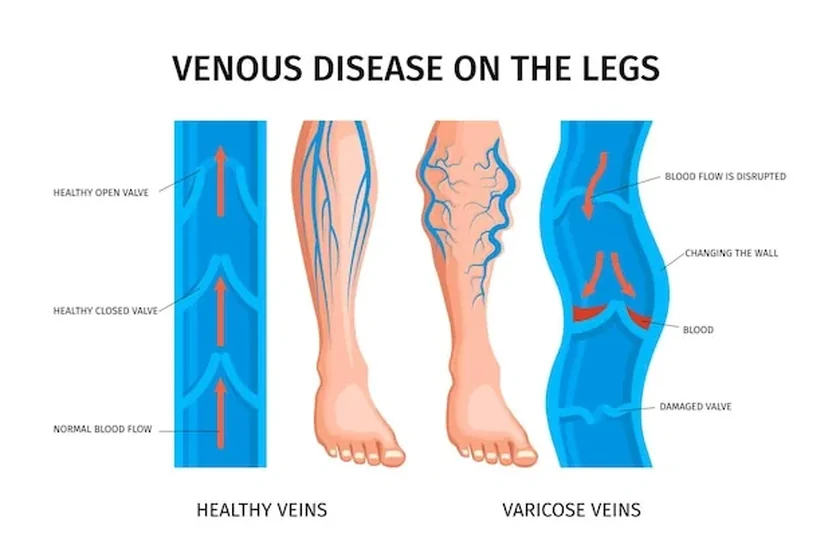
What is Varicose Vein?
Varicose veins, those twisted, enlarged veins predominantly seen on the legs, are not just a cosmetic concern but can also pose serious health risks. One such risk is the bursting of a varicose vein, which, while rare, requires immediate attention. Understanding what leads to such incidents, recognizing the symptoms, and knowing the steps to take if it happens is crucial. This guide, informed by the expertise of Varicose Veins Specialists in Vadodara, aims to shed light on everything you need to know about burst varicose veins, from prevention to treatment options.
What Makes a Varicose Vein Burst
Varicose veins occur when veins become enlarged, swollen, and twisted, often appearing just under the skin’s surface, primarily on the legs. While they are commonly associated with cosmetic concerns, varicose veins can lead to more serious health issues, including the risk of bursting. Understanding what causes a varicose vein to burst is crucial for prevention and effective management.
The Anatomy of a Varicose Vein
To grasp why varicose veins may burst, it’s important to understand their anatomy. Veins are blood vessels that return blood from the body back to the heart. They contain one-way valves that prevent blood from flowing backwards. When these valves fail or become weak, blood can pool in the vein, increasing pressure within. Over time, this pressure can cause the vein to become enlarged and twisted – leading to the formation of a varicose vein.
Factors Contributing to a Burst Varicose Vein
Several factors can increase the risk of a varicose vein bursting:
Increased Pressure: Standing or sitting for prolonged periods can heighten the pressure in the veins of the lower legs, exacerbating the risk of bursting.
Vein Wall Weakness: The walls of varicose veins are already stretched and weakened due to the increased pressure from pooling blood. This makes them more susceptible to injury.
External Injuries: Even minor injuries to the area can cause a weakened varicose vein to burst. The skin over a varicose vein is often thinner, making it more vulnerable. One common problem patients have noticed is rubbing a towel after a hot bath can also lead to sudden burst and bleeding.
Advanced Age: Aging can lead to reduced elasticity in vein walls, increasing the risk of tears.
Obesity: Excess weight puts additional pressure on veins, contributing to the risk of bursting.
What Happens When a Varicose Vein Bursts?
When a varicose vein bursts, it can lead to bleeding under the skin or an open wound. Since varicose veins are located close to the skin’s surface and contain blood that is under higher pressure, the bleeding can be significant and may not stop without intervention.
Symptoms of a Burst Varicose Vein
When a varicose vein bursts, symptoms can range from minor to severe, including:
- Sudden, sharp pain at the site of the burst vein
- Swelling and redness around the area
- Significant bleeding, as the veins are under pressure
- In some cases, a bruise may appear if bleeding is under the skin
What to Do When a Varicose Vein Bursts
When a varicose vein bursts, it can lead to sudden and significant bleeding, necessitating immediate action to minimize blood loss and prevent further complications. Here’s a step-by-step guide on what to do if you or someone you know experiences a burst varicose vein:
Immediate Steps for Managing a Burst Varicose Vein
Apply Pressure: The first and most crucial step is to apply direct pressure to the bleeding site. Use a clean cloth or bandage and press firmly but gently against the wound. This helps to stem the flow of blood. If bleeding is severe and through an open wound, continue applying pressure until medical help arrives. Or apply a tight bandage and do not open it just to have a look if the bleeding has stopped.
Elevate the Affected Limb: Elevate the leg higher than the heart. This reduces blood pressure in the veins of the leg, slowing the bleeding. You can use pillows or cushions to prop up the leg comfortably.
Seek Medical Attention: Even if the bleeding stops, it’s important to seek medical attention as soon as possible. A healthcare professional or a Varicose Vein Specialist can assess the severity of the situation, provide appropriate wound care, and determine if further treatment is needed to prevent future occurrences.
After Immediate Care
Follow-Up Care: The doctor may recommend follow-up care which could include the use of compression stockings to support vein health and prevent further incidents. They might also advise on lifestyle changes or treatments to address the underlying varicose veins.
Monitor the Site: After a burst varicose vein, it’s crucial to monitor the site for signs of infection, such as increased redness, swelling, warmth, or pus. If you notice any of these signs, contact a healthcare provider immediately.
Rest and Recovery: Allow yourself time to rest and recover. Avoid strenuous activities that could exacerbate the situation or lead to another burst vein.
Preventive Measures
Wear Compression Stockings: Regularly wearing prescribed compression stockings can help prevent varicose veins from worsening and reduce the risk of them bursting. Here is the guide on how to wear Varicose vein stockings.
Manage Risk Factors: Addressing risk factors such as obesity, high blood pressure, and prolonged periods of standing or sitting can help reduce the pressure on your veins.
Routine Check-Ups: Regular visits to a Varicose Veins Specialist, especially if you have existing varicose veins, can help manage the condition and prevent complications.
When to See a Doctor
Immediate medical attention is required if a varicose vein bursts. Subsequently, consulting with a Varicose Vein Specialist in Vadodara or your local area is vital for a comprehensive assessment and to explore treatment options that can prevent future occurrences. Specialists like Dr. Sumit Kapadia offer expert advice and treatment options tailored to individual needs, ensuring the best possible outcomes for patients with varicose veins.
By understanding what to do when varicose veins bursts and taking proactive steps to manage varicose veins, individuals can significantly reduce the risk of complications and improve their overall vein health.
How to Prevent Varicose Vein from Bursting
Preventive measures focus on reducing the pressure in the veins and strengthening vein walls:
- Wear compression stockings to improve circulation.
- Maintain a healthy weight to reduce pressure on your legs.
- Exercise regularly to boost blood flow.
- Avoid standing or sitting for extended periods without breaks.
Treat Your Varicose Veins Today
Early treatment of varicose veins can prevent complications, including bursting. Today’s treatments range from lifestyle changes and compression therapy to minimally invasive procedures like sclerotherapy and laser treatments that close off or remove affected veins.
How Can I Find a Good Vein Doctor?
Seeking treatment from a qualified Varicose Vein Specialist is critical. Look for a doctor with specialized training in vascular surgery, like those found in Vadodara, known for their expertise in treating varicose veins. Check credentials, read patient reviews, and consider the doctor’s experience with various treatment options.
FAQs on Burst Varicose Veins
Yes, it can be serious due to the risk of significant blood loss.
Minor injuries may heal, but medical evaluation is always advised.
Apply pressure, elevate the leg, and seek medical attention.
While not common, it’s possible if blood flow is restricted around the area.
Yes, consult a healthcare provider to assess the situation and receive appropriate care.
Conclusion
A burst varicose vein, though an uncommon occurrence, should never be overlooked. Understanding the reasons behind it, recognizing the signs, and knowing how to respond can be lifesaving. More importantly, taking preventive steps and seeking early treatment for varicose veins can significantly reduce the risk of such complications. If you’re in Vadodara or nearby, consulting with a Varicose Vein Specialist can provide you with the best course of action tailored to your condition, ensuring your vein health is managed effectively and safely.

MBBS, MS, MRCS, DNB-Fellow
Dr. Sumit Kapadia
Dr. Sumit Kapadia / MR KAPADIA SUMIT a gold-medalist from Baroda Medical College, obtained his general surgical training and senior residency from SSG Hospital, Vadodara.

MBBS, MS, MRCS, DNB-Fellow
Dr. Sumit Kapadia
Dr. Sumit Kapadia / MR KAPADIA SUMIT a gold-medalist from Baroda Medical College, obtained his general surgical training and senior residency from SSG Hospital, Vadodara.



